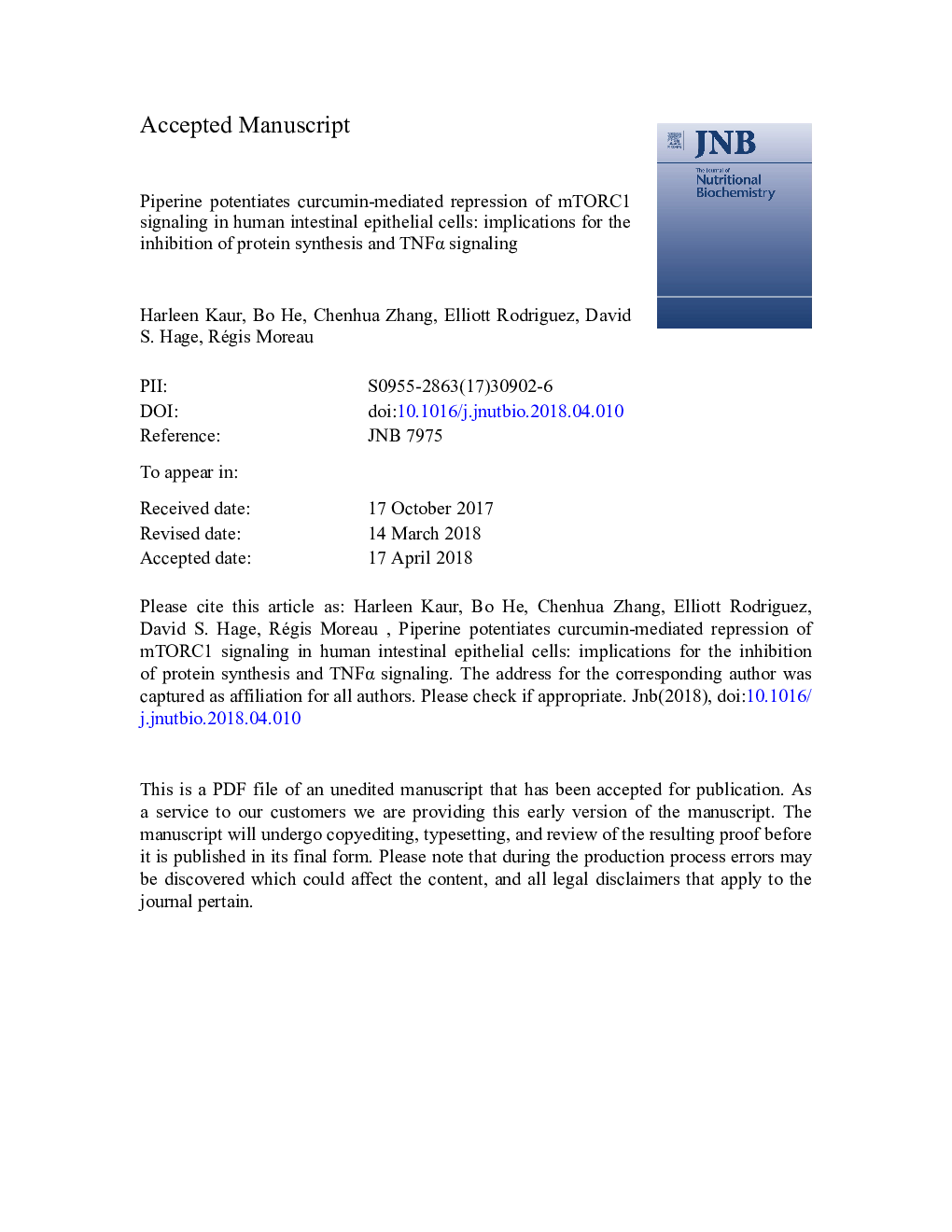| کد مقاله | کد نشریه | سال انتشار | مقاله انگلیسی | نسخه تمام متن |
|---|---|---|---|---|
| 8336343 | 1540611 | 2018 | 26 صفحه PDF | دانلود رایگان |
عنوان انگلیسی مقاله ISI
Piperine potentiates curcumin-mediated repression of mTORC1 signaling in human intestinal epithelial cells: implications for the inhibition of protein synthesis and TNFα signaling
دانلود مقاله + سفارش ترجمه
دانلود مقاله ISI انگلیسی
رایگان برای ایرانیان
کلمات کلیدی
eEF2AKT serine/threonine kinase 1p70S6KEukaryotic elongation factor 2 kinaseRHEBRASBCACOX-2HRPeukaryotic translation initiation factor 4E binding protein 14EBP1DTTTSC1/2eEF2KPRAS40CYP3A4PiperineCURBRAFTNFαmTORC1PI3Kproline-rich Akt substrate 40IKKαDMSO - DMSOERK1/2 - ERK1 / 2MAPK - MAPKNFκB - NFKBAkt - آکتinflammation - التهاب( توروم) bicinchoninic acid - بیسینکنینیک اسیدtumor necrosis factor alpha - تومور نکروز عامل آلفاdithiothreitol - دیتیوتریتولDimethyl sulfoxide - دیمتیل سولفواکسیدRas homolog enriched in brain - رایحه همولوگ در مغز غنی شده استRaptor - رپتورTurmeric - زردچوبهColorectal cancer - سرطان روده بزرگcytochrome P450 3A4 - سیتوکروم P450 3A4Cyclooxygenase-2 - سیکلوکوکسیژناز2eukaryotic translation elongation factor 2 - ضریب کشش ترجمه یوکاریوتی 2nuclear factor kappa B - فاکتور هسته ای کاپا Bphosphoinositide 3 kinase - فسفونیوزید 3 کینازPepper - فلفلPhenolics - فنولیکmechanistic target of rapamycin complex 1 - هدف مکانیکی مجتمع رپامایسین 1Horseradish peroxidase - پراکسیداز هوررادیشregulatory-associated protein of mTOR - پروتئین مرتبط با تنظیم کننده mTORmitogen activated protein kinase - پروتئین کیناز فعال Mitogen فعال استPiP - پیپCurcumin - کورکومینGlucuronidation - گلوکورونید شدن
موضوعات مرتبط
علوم زیستی و بیوفناوری
بیوشیمی، ژنتیک و زیست شناسی مولکولی
زیست شیمی
پیش نمایش صفحه اول مقاله

چکیده انگلیسی
Persistent activation of the mechanistic target of rapamycin complex 1 (mTORC1) is linked to sustained inflammation and progression of colorectal cancer. Widely available dietary phenolics, curcumin and piperine are purported to have antiinflammatory and anticarcinogenic activities through yet-to-be-delineated multitarget mechanisms. Piperine is also known to increase the bioavailability of dietary components, including curcumin. The objective of the study was to determine whether curcumin and piperine have individual and combined effects in the setting of gut inflammation by regulating mTORC1 in human intestinal epithelial cells. Results show that curcumin repressed (a) mTORC1 activity (measured as changes in the phosphorylation state of p70 ribosomal protein S6 kinase B1 and 40S ribosomal protein S6) in a dose-dependent manner (2.5-20 μM, P<.007) and (b) synthesis of nascent proteins. Piperine inhibited mTORC1 activity albeit at comparatively higher concentrations than curcumin. The combination of curcumin + piperine further repressed mTORC1 signaling (P<.02). Mechanistically, curcumin may repress mTORC1 by preventing TSC2 degradation, the conserved inhibitor of mTORC1. Results also show that a functional mTORC1 was required for the transcription of TNFα as Raptor knockdown abrogated TNFα gene expression. Curcumin, piperine and their combination inhibited TNFα gene expression at baseline but failed to do so under conditions of mTORC1 hyperactivation. TNFâ-induced cyclooxygenase-2 expression was repressed by curcumin or curcumin + piperine at baseline and high mTORC1 levels. We conclude that curcumin and piperine, either alone or in combination, have the potential to down-regulate mTORC1 signaling in the intestinal epithelium with implications for tumorigenesis and inflammation.
ناشر
Database: Elsevier - ScienceDirect (ساینس دایرکت)
Journal: The Journal of Nutritional Biochemistry - Volume 57, July 2018, Pages 276-286
Journal: The Journal of Nutritional Biochemistry - Volume 57, July 2018, Pages 276-286
نویسندگان
Harleen Kaur, Bo He, Chenhua Zhang, Elliott Rodriguez, David S. Hage, Régis Moreau,